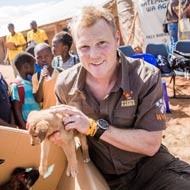
Over 35,000 dogs vaccinated in 20 days
A project to rid the world of rabies has once again beaten its ambitious target - this time to vaccinate 70 per cent of dogs in one Malawian city.
The Mission Rabies team vaccinated a total of 35,208 dogs against rabies in just 20 days - more than 70 per cent of Blantyre's dog population. This equates to three dogs vaccinated every working minute.
Furthermore, nearly 50,000 children were taught how to protect themselves from dog bites and rabies fatalities.
Around 90 per cent of rabies cases globally occur in Asia and Africa. Veterinary surgeon Luke Gamble established Mission Rabies in India in 2013, with the long-term aim of eradicating this devastating disease.
Luke read a paper in The Lancet journal describing an urgent problem with paediatric rabies deaths in Blantyre. After getting in touch with the paper's authors, Nigel Kennedy and Mac Mallewa, Luke formed a plan to tackle the disease in this African hotspot.
A team of more than 100 Malawian staff and international volunteers from 12 countries worked together to achieve the ambitious target for Blantyre.
They went door-to-door vaccinating in people's homes and visited schools to educate children and rabies and preventing dog bites. Dog owners also queued at the static vaccination points.
Each owner received a vaccination, record card, education leaflet and a Mission Rabies band.
Finally, a roundtable discussion was held on the challenges and opportunities faced by the project in Malawi and on the African continent. It was attended by representatives from the World Health Organisation, Dogs Trust, World Veterinary Service, Malawian and Namibian government, Blantyre SPCA and many more.
Image courtesy of Mission Rabies.



 The Veterinary Medicines Directorate (VMD) is inviting applications from veterinary students to attend a one-week extramural studies (EMS) placement in July 2026.
The Veterinary Medicines Directorate (VMD) is inviting applications from veterinary students to attend a one-week extramural studies (EMS) placement in July 2026.